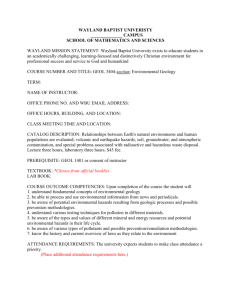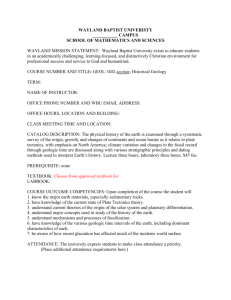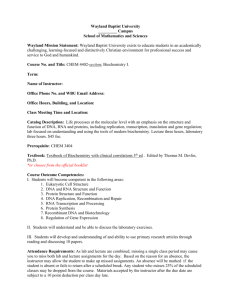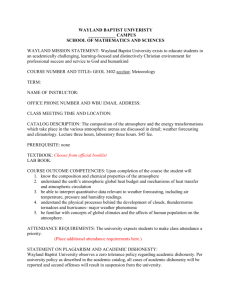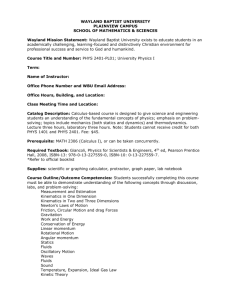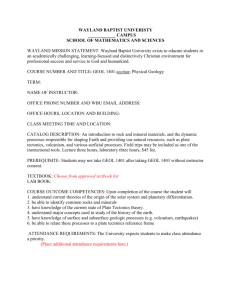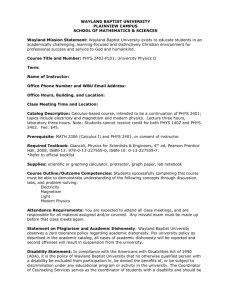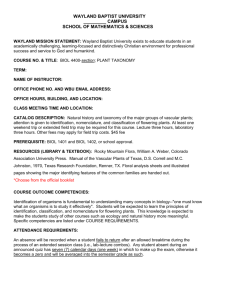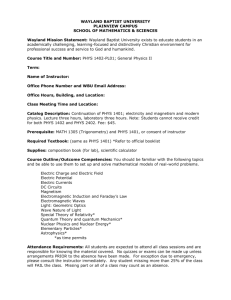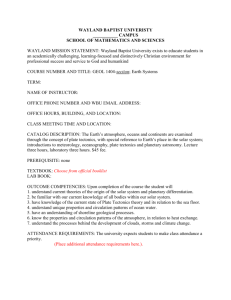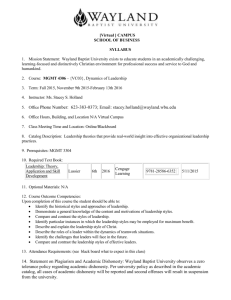BIOL 3407 - Wayland Baptist University
advertisement
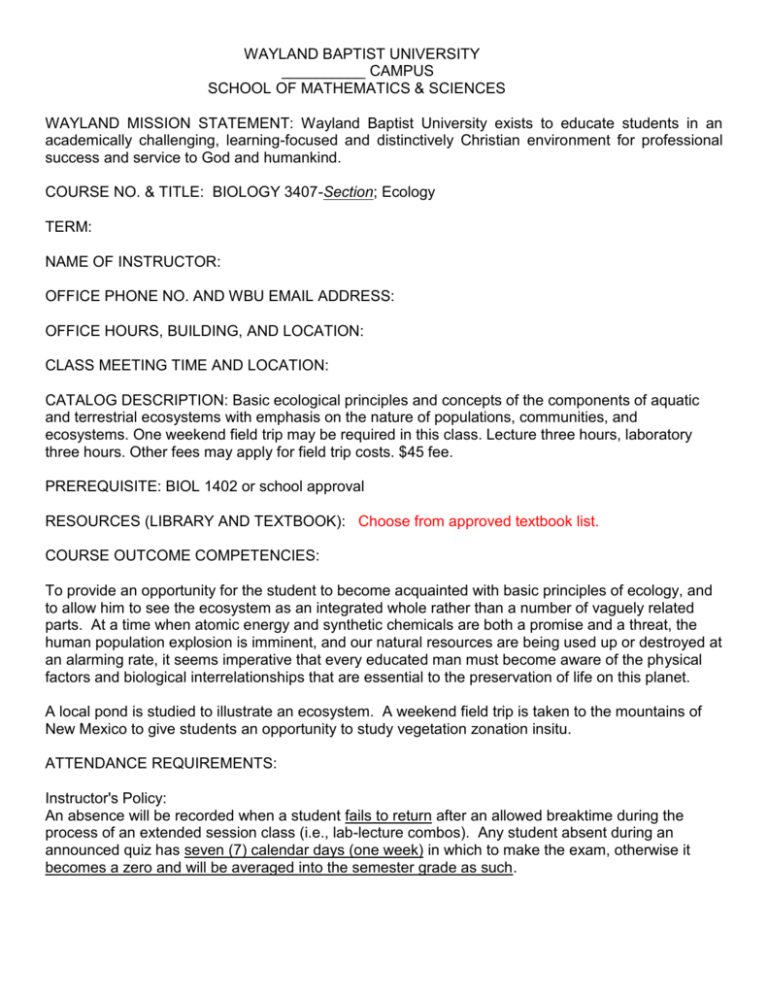
WAYLAND BAPTIST UNIVERSITY __________ CAMPUS SCHOOL OF MATHEMATICS & SCIENCES WAYLAND MISSION STATEMENT: Wayland Baptist University exists to educate students in an academically challenging, learning-focused and distinctively Christian environment for professional success and service to God and humankind. COURSE NO. & TITLE: BIOLOGY 3407-Section; Ecology TERM: NAME OF INSTRUCTOR: OFFICE PHONE NO. AND WBU EMAIL ADDRESS: OFFICE HOURS, BUILDING, AND LOCATION: CLASS MEETING TIME AND LOCATION: CATALOG DESCRIPTION: Basic ecological principles and concepts of the components of aquatic and terrestrial ecosystems with emphasis on the nature of populations, communities, and ecosystems. One weekend field trip may be required in this class. Lecture three hours, laboratory three hours. Other fees may apply for field trip costs. $45 fee. PREREQUISITE: BIOL 1402 or school approval RESOURCES (LIBRARY AND TEXTBOOK): Choose from approved textbook list. COURSE OUTCOME COMPETENCIES: To provide an opportunity for the student to become acquainted with basic principles of ecology, and to allow him to see the ecosystem as an integrated whole rather than a number of vaguely related parts. At a time when atomic energy and synthetic chemicals are both a promise and a threat, the human population explosion is imminent, and our natural resources are being used up or destroyed at an alarming rate, it seems imperative that every educated man must become aware of the physical factors and biological interrelationships that are essential to the preservation of life on this planet. A local pond is studied to illustrate an ecosystem. A weekend field trip is taken to the mountains of New Mexico to give students an opportunity to study vegetation zonation insitu. ATTENDANCE REQUIREMENTS: Instructor's Policy: An absence will be recorded when a student fails to return after an allowed breaktime during the process of an extended session class (i.e., lab-lecture combos). Any student absent during an announced quiz has seven (7) calendar days (one week) in which to make the exam, otherwise it becomes a zero and will be averaged into the semester grade as such. STATEMENT ON PLAGIARISM AND ACADEMIC DISHONESTY: Wayland Baptist University observes a zero tolerance policy regarding academic dishonesty. Per university policy as described in the academic catalog, all cases of academic dishonesty will be reported and second offenses will result in suspension from the university. DISABILITY STATEMENT: In compliance with the Americans with Disabilities Act of 1990 (ADA), it is the policy of Wayland Baptist University that no otherwise qualified person with a disability be excluded from participation in, be denied the benefits of, or be subject to discrimination under any educational program or activity in the university. The Coordinator of Counseling Services serves as the coordinator of students with a disability and should be contacted concerning accommodation requests at (806) 2913765. Documentation of a disability must accompany any request for accommodations. COURSE REQUIREMENTS AND GRADING CRITERIA: Laboratory time will be devoted to learning techniques and procedures for measuring energy flow and mineral cycling in ecosystems. Considerable time will be spentin the application of these techniques. Data will be obtained from local ponds and terrestrial communities, evaluated and written up in journal form. Course Evaluation: University Grading System: A = 90 - 100 B = 80 - 89 C = 70 - 79 D = 60 - 69 F = BELOW 60 I = INCOMPLETE + W = WITHDRAWAL + A grade of incomplete is changed if the deficiency is made up by midterm of the next regular semester, otherwise, it becomes a "F". This grade is given only if circumstances beyond the student's control prevented completion of work during the semester enrolled and attendance requirements have been met. POINTS Hour exams (5) Laboratory Field trip or Library research Final exam TOTAL POINTS Students shall have protection through orderly procedures against prejudices or capricious academic evaluation. A student who believes that he or she has not been held to realistic academic standards, just evaluation procedures, or appropriate grading, may appeal the final grade given in the course by using the student grade appeal process described in the Academic Catalog. Appeals may not be made for advanced placement examinations or course bypass examinations. Appeals are limited to the final course grade, which may be upheld, raised, or lowered at any stage of the appeal process. Any recommendation to lower a course grade must be submitted through the Executive Vice President/Provost to the Faculty Assembly Grade Appeals Committee for review and approval. The Faculty Assembly Grade Appeals Committee may instruct that the course grade be upheld, raised, or lowered to a more proper evaluation. TENTATIVE COURSE OUTLINE: I. Introduction A. Terminology B. Scope of Ecology II. The Ecosystem A. The Component Parts B. The Pond as an Ecosystem C. The Terrestrial Ecosystem D. Other Ecosystems E. Taxonomic Components 1. The ecological niche 2. Species structure III. Energy Flow and Nature's Metabolism IV. Biochemical Cycles V. Limiting Factors VI. Ecological Succession VII. Major Ecosystems A. Sea B. Estuaries and seashores C. Streams and rivers D. Lakes and ponds E. Fresh-water marshes F. Deserts G. Tundras H. Grasslands I. Forests ADDITIONAL INFORMATION: optional Revised 03/17/15
